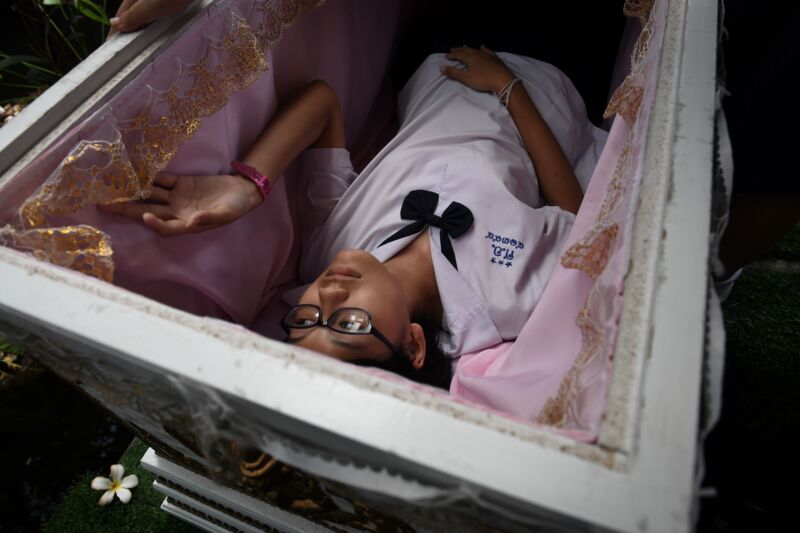 Why being declared dead when you’re alive still occurs
Why being declared dead when you’re alive still occurs
17/2/2023, 12:13
coffin flop —
Death is a process, not an event, and some steps appear to be reversible.

Stephen Hughes, The Conversation - 2/16/2023, 2:13 PM

Enlarge / This photo taken on March 30, 2018, shows a Thai teenager trying out a traditional coffin at the Kid Mai Death Awareness Cafe, an exhibition space built to educate the public about death and Buddhism, in Bangkok.
LILLIAN SUWANRUMPHA/AFP via Getty Images
82 with
An 82-year-old woman who was recently pronounced dead at a New York nursing home was later discovered to be alive by funeral home staff. This follows a similar incident in Iowa where a 66-year-old woman with early-onset dementia was declared dead by a nurse, only to be found gasping for air when funeral home staff unzipped the body bag.
Fortunately, these events are very rare. But fear of them is visceral, which might explain an old naval custom. When sewing the canvas shroud for a dead sailor, the sailmaker would take the last stitch through the nose of the deceased. Having a sailcloth needle through the nose was presumed to be a potent enough stimulus to wake any sailor who was actually still alive.
Confirmation of death these days is thankfully a lot less brutal.
An absence of heart and breath sounds over a period of time, the presence of fixed, dilated pupils, and a failure to respond to any stimulus should mean that the person is deceased. All doctors are taught how to do this and all are aware of their duties.
Unfortunately, there have been instances where death has been confirmed by this process, yet the patient has shown signs of life afterward.
Over the years, I have seen this happen. One day in a hospital, a colleague pronounced an elderly woman dead, but a short while later, she started breathing again and her pulse was briefly restored.
In another unforgettable incident, the medical emergency team was summoned with the words: “Cardiac arrest. Mortuary. This is not a joke!” A woman had taken an overdose of barbiturates prescribed for her epilepsy. She had been seen by a general practitioner who certified that she was dead.
But on arrival at the mortuary, one of her legs was seen to be twitching. Excruciating embarrassment all around. And if I recall correctly, she recovered.
Failure to perform the confirmation-of-death procedure properly explains some instances of people being incorrectly declared dead. A cursory examination while distracted could easily lead to a failure to hear heart sounds and spot shallow, infrequent breaths. It pays to be thorough. However, some drugs we give patients can make the task harder.
Drugs, toxins, and cold water
Sedating drugs are thought in some way to protect the brain from damage, and this is made use of in anesthesia for major surgical procedures, particularly if it is necessary to stop the circulation for a time.Less usefully, and with the potential to cause alarm, an overdose of sedatives reduces responsiveness and depresses the breathing and circulation, leading to the impression of death while protecting the brain from hypoxia (oxygen starvation). Later on, as the drug is cleared from the body, the person may wake up.
Diazepam (brand name Valium) and alprazolam (brand name Xanax) have both caused people to mistakenly be declared dead.
Certain toxins may have a similar effect. Voodoo practitioners called Bokors apparently administered powders to victims to make them seem dead. These powders reportedly contained small doses of tetrodotoxin from puffer fish to paralyze the victim, who was then presumably abducted before burial and enslaved. Could neurological damage from the “zombification” process account for the popular image of the zombie?
Immersion in cold water can also lead to the illusion of death because of its effect on slowing the heart rate. Survival after considerable periods of time in the water is well documented.
In emergency medicine, it has long been taught that a drowned patient is not proven dead until they have been warmed up. Good neurological recovery has been reported after periods of cold water immersion of up to 70 minutes
Fainting might also deceive the certifying doctor. Activation of the vagus nerve (the longest cranial nerve in the body) occurs during fainting, slowing the heart and reducing blood pressure.
This might account for a very sad case reported from Honduras. A pregnant teenager was thought to have died from shock after hearing gunfire in her neighborhood. She was heard screaming within her tomb a day after her funeral. It is quite possible that she had woken up after a prolonged faint.
Many cases seem to originate outside of Europe. Geographical variation in medical confirmation of death procedure may explain this. Perhaps errors arise when people are less likely to be able to afford the costs of a doctor.
Whatever the cause, these cases appear in the media because they are sensational and attract lurid attention, but ultimately they are very rare.

Stephen Hughes, senior lecturer in medicine, Anglia Ruskin University.
This article is republished from The Conversation under a Creative Commons license. Read the original article.
arstechnica.com
_________________

Δικαιώματα σας στην κατηγορία αυτή
Μπορείτε να απαντήσετε στα Θέματα αυτής της Δ.Συζήτησης





